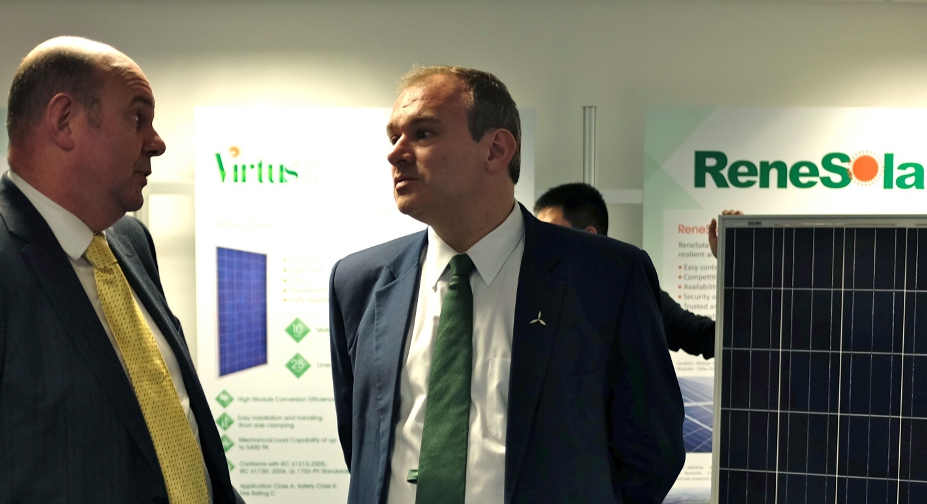Energy storage will be the most important “complementary technology” to work alongside renewables and energy efficiency, secretary of state for climate change and energy Ed Davey has told Next Energy News.
Davey said storage, including its pairing with solar, will be instrumental in shaping the future of the electrical grid and energy policy, if the UK is to reach “almost unimaginable” reductions in carbon emissions.
During a visit to the UK offices of China-headquartered solar module manufacturer ReneSola in East Sussex, Davey told Next Energy News that he “could not be more convinced” that the “dramatic transition” to a low carbon, energy efficient and secure energy network for the UK will require large amounts of energy storage.
Talking specifically about solar, Davey said that as costs of solar continue to fall, keeping it on track to make it the cheapest form of electricity in the future, those responsible for grid infrastructure and energy policy would have to adapt to the challenge with the use of such complementary technologies.
“The people I talk to, whether they’re in financial institutions or research labs, are showing very clearly that solar costs are going to come down and down, so it will be the cheapest form of electricity, I’m absolutely convinced about that,” he said.
“I think that this century will be the solar century and I think the challenge for those managing electricity grids and energy policy is how to manage that transition and it will be partly about understanding complementary technologies, like most importantly of all, storage technology,” Davey said.
.
The UK has made some progress on energy storage, with companies including ReneSola and British battery specialist Moixa carrying out residential pilot projects at a few dozen houses. Large-scale projects are being tested through the Low Carbon Network Fund (LCNF) projects, where developers bid for projects based on technical feasibility and research findings are shared across the network. Former minister of state for DECC, Greg Barker, had also given funding to a number of one-off projects at the end of last year and the beginning of this one, before he left office to make way for the current incumbent, Matt Hancock.
Despite Davey’s words of encouragement for the UK solar industry and the assertion of his belief in the transformative power of solar-plus-storage, he appeared to say that storage would not be possible to tackle by the UK alone.
“To me…the tie-up between solar and storage is one of the most significant things we can do. We’ve done some on storage. I’d like to do more, but it needs global capital to get behind storage technology.
“This dramatic transition that we’re making is not going to go smoothly, it’s not going to happen quickly, but what has to happen, what’s going to happen, we are going to see a massive amount of energy storage, it will happen, I could not be more convinced of this.”
Asked how storage could be paid for and how storage system operators could be paid, Davey said capacity markets were likely to see market incentives introduced, but the minister remained vague on the issue of whether a subsidy programme might be on the cards for energy storage. He did say however that in his view, the government’s role in storage is to support research and development (R&D) work.
“There will probably be more than one storage technology for different types of environments and situations, so I think the government’s role in storage is a big investment in R&D innovation. But as we plan our policies going forward, and I’m particularly focused on the capacity market, we’re looking at storage being able to play into the capacity market, so there will be market incentives as well.”
However as solar industry veteran Ray Noble, now also an advisor on EVs and storage technologies, told Next Energy News’ international sister publication PV Tech Storage recently, the UK government has not made any definitive rulings on storage.
“At the moment, in policy, there’s no government policy around storage whatsoever. They think it’s science and innovation, still years away.”
Asked if he thought it was likely any political party would attempt to make any progress on the issues surrounding storage, not least of all where the “pricing points” would be for delivering services through the technology, Noble demonstrated scepticism that the UK would see any significantly rulings before the General Election in May.
“If you talk to Mr Osborne [chancellor of the Exchequer George Osborne], Mr Osborne would say ‘no more subsidies, I’m sick of subsidies!’”
“DECC still have storage in its science and innovation group which hasn’t moved across yet to real world, I expect that after the election it will move into ‘real world’.”
Noble said that in the meantime it would be a question of schemes like the LCNF working to establish the “pricing points” for storage as well as developing appropriate technologies.
“What I believe needs to be done is, we need to do a lot of exercises like the ones I’ve just described that are going on through LCNF to work out what are these scenarios, what are these pricing points. Because immediately after the election they’re gonna have a major problem obviously with shortagte of supply, risk of brownouts etc in the UK, so therefore you need to have all these points to know, as the price of electricity increases, when does storage become viable through various routes? And so on.”
.





